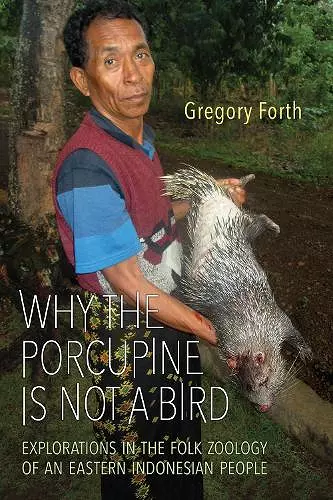Why the Porcupine is Not a Bird
Explorations in the Folk Zoology of an Eastern Indonesian People
Format:Paperback
Publisher:University of Toronto Press
Published:26th Feb '16
Currently unavailable, and unfortunately no date known when it will be back
This paperback is available in another edition too:
- Hardback£68.00(9781487500047)

"Why the Porcupine Is Not a Bird is an important contribution to our knowledge of the folk-zoology of island Southeast Asia by an experienced and industrious ethnographer of the Nage." -- Roy Ellen, Professor Emeritus, School of Anthropology and Conservation, University of Kent "Why the Porcupine Is Not a Bird is a breakthrough. Gregory Forth's innovative account of Nage animal categories and taxonomies demonstrates that the Nage people possess not only symbolic knowledge of animals but also empirical knowledge and skeptical minds compatible with international scientific practice." -- Scott Simon, Professor, School of Sociological and Anthropological Studies, University of Ottawa
Why the Porcupine Is Not a Bird is a comprehensive analysis of knowledge of animals among the Nage people of central Flores in Indonesia.
Why the Porcupine Is Not a Bird is a comprehensive analysis of knowledge of animals among the Nage people of central Flores in Indonesia. Gregory Forth sheds light on the ongoing anthropological debate surrounding the categorization of animals in small-scale non-Western societies.
Forth’s detailed discussion of how the Nage people conceptualize their relationship to the animal world covers the naming and classification of animals, their symbolic and practical use, and the ecology of central Flores and its change over the years. His study reveals the empirical basis of Nage classifications, which align surprisingly well with the taxonomies of modern biologists. It also shows how the Nage employ systems of symbolic and utilitarian classification distinct from their general taxonomy. A tremendous source of ethnographic detail, Why the Porcupine Is Not a Bird is an important contribution to the fields of ethnobiology and cognitive anthropology.
‘This book is valuable for specialists in Indonesia and in folk classification systems.’
-- E.N, Anderson * Choice Magazine vol 54:02:2016 *‘A thought provoking monograph based on authors’ thirty years of field research. It is a good book to think with.’
-- Nathan Porath * Journal of the Humanities & Social Sciences of Southeast Asia. Vol 172:04:20ISBN: 9781487520014
Dimensions: 229mm x 152mm x 25mm
Weight: 600g
400 pages